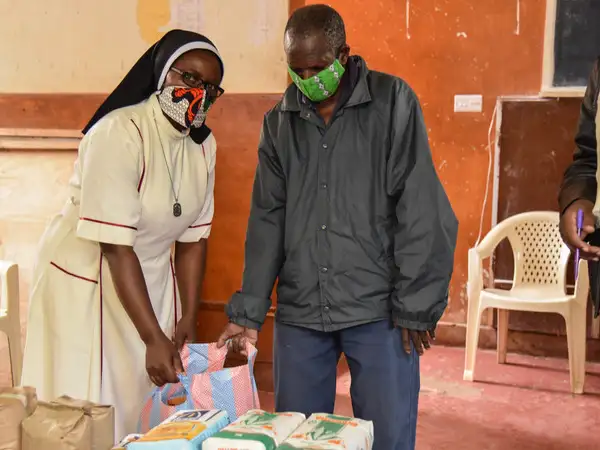

Sister Modeasther Karuri, the Caritas Nairobi programme manager, giving out food baskets as part of the local response to coronavirus in Kenya.
As Covid-19 continues to wreak havoc across the world – decimating people’s livelihoods, and leaving health systems struggling to provide healthcare and vaccines for the entire population – the Church should be seen as vital partner.
The essential Church networks, trusted and rooted in local communities, can help the most vulnerable people in the most remote places where governments often struggle to reach. DR Congo is among several countries where the Catholic Church is the main provider of community health services, particularly in more remote areas.
CAFOD’s Head of Policy, Graham Gordon, has written a new report describing the distinctive role of the Catholic Church in development and humanitarian response. He explains more on how the Church plays a crucial part in fighting emergencies, supporting peace and giving hope to communities.
Church response to coronavirus
“The Catholic Church has the second-largest aid network in the world. In many countries, it is the only way of reaching the people who need urgent support. This was clear during the Ebola crisis in West Africa, and we are putting that experience to work in fighting Covid-19.
“The Catholic Church is making a distinctive contribution, such as providing shelter and food for thousands of Rohingya refugees in Bangladesh.”
Support during conflict
“Long-term relationships, commitment to communities and acceptance by the local population mean that the Church is often the only institution that stays put when conflict erupts, as in South Sudan.
"Church leaders will often be at the forefront of defending people’s rights and speaking out for peace and justice, such as through the Church’s Land Commission in Brazil. But its potential as a development and humanitarian partner remains largely untapped.”
Hope for the future
“Colliding with coronavirus is a crisis of hunger, ongoing conflict and displacement, climate change and economies on the verge of collapse. Communities who have worked to transform their lives, now find themselves extremely vulnerable and fearful.
"But the good news is that the Church sits on all these frontlines and will remain long after the international community move on, supporting communities to recover, and rebuilding lives and livelihoods.”
Read CAFOD's new report on the distinctive role of the Catholic Church

